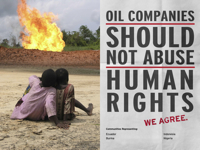Chevron Meeting to Highlight Companies Successes Turned into Forum on Abuses: Oil Giant Withers Under Criticism from Communities Suffering Human Rights and Environmental Harms
FOR IMMEDIATE RELEASE
May 25, 2011
Contact: Antonia Juhasz
antoniajuhasz@gmail.com
415-846-5447
—Photos, Video and Interviews Available–
 San Ramon, CA — Today at Chevron’s annual shareholder meeting, 22 indigenous, First Nation, and other impacted community members and supporters who had traveled to the company’s headquarters from locations around the globe and across the state confronted CEO John Watson with the brutal human and environmental abuses caused by the oil giants operations.
San Ramon, CA — Today at Chevron’s annual shareholder meeting, 22 indigenous, First Nation, and other impacted community members and supporters who had traveled to the company’s headquarters from locations around the globe and across the state confronted CEO John Watson with the brutal human and environmental abuses caused by the oil giants operations.
Watson struggled to defend his company’s record in the face of the devastating criticism from institutional investors, shareholders, and impacted community members and was instead forced to turn multiple times to pre-packed video and slideshows prepared prior to the meeting.
Outside the meeting, 150 supporters rallied in a colorful and creative protest against the company’s operations around the world and across their home state. [video footage]
Community leaders from Angola, Ecuador, Nigeria, Indonesia, the tarsands of Canada, Alaska, Texas, and Richmond, and those representing communities in China, Australia, the Philippines, Kazakhstan, and more attended the meeting as share- and proxy-holders providing first-hand descriptions of their lives and environment in and around Chevron’s operations.
While Watson tried to highlight the company’s human rights, environmental, and economic successes, when the microphones were opened to shareholders, those successes quickly turned to failures. Half the meeting became a referendum on the company’s disastrous track record of supporting brutal dictators in Burma, decimating local livelihoods though its offshore operations in Alaska and Angola, and causing mass pollution and destruction of human health in locations as diverse as Ecuador, Richmond, California, Kazakhstan, Indonesia, and Nigeria.
Emem Okon of the Kebetkache Women Development and Resource Centre, who had come from Nigeria’s Niger Delta, challenged Watson’s assertions that the company had improved its record on flaring.
“I am here to represent the women of the Niger Delta who live in communities near gas flares and who suffer health issues of infertility, early menopause, miscarriages, cancer, rashes; women who fish in waters polluted by Chevron.” Ms. Okon asked CEO Watson, “When will Chevron stop environmental violence against women? When will Chevron stop the toxic flares in the Niger Delta. When will Chevron management meet with the women of the Niger Delta and their international allies.”
Thomas Evans of the Nanwalek Tribe spoke in response to Chevron’s claims of the health and safety of its offshore operations. Evans spoke of the harmful impacts from the toxic discharge of produced waste from Chevron’s offshore drilling rig on his community and environment in Cook Inlet, Alaska. Mr. Evans said he will return to Alaska and report to his Tribe that Chevron CEO Watson “does not care about our subsistence way of life, and is totally disrespectful of our culture, and of all the people dying of cancers.”
Gitz Crazyboy (Ryan) Deranger, of the First Nation Dene/Pikini (Blackfoot) people, came to the meeting from Alberta, Canada where Chevron is partner in extensive tarsands operations. “Chevron’s pollution is killing our way of life. Our moose and caribou are dying. Our fish are dying. Chevron is destroying our culture, Chevron is committing cultural genocide.”
Elias Isaac, of the Open Society Institute, traveled from Angola to attend the meeting and directly challenge Watson’s assertion that Chevron is supporting human rights and local economies in Angola. “Chevron’s understanding and definition of human rights is completely distorted. Their approach is to respond with charity work, but this does not address the long-term sustainable economic and social challenges facing the local fishing communities of Cabinda Province.”
Each speaker carried a copy of the True Cost of Chevron: An Alternative Annual Report, on which all had worked. They provided the report to eager shareholders, but when Richmond resident Reverend Kenneth Davis attempted to hand the report to Watson, he was stopped by private security guards. Watson threatened to stop the entire meeting if the Reverend insisted on handing the report directly to him.
At the meetings conclusion, the community leaders exited to a cheering and supportive crowd. They called the meeting a success and vowed to return again next year.
—–
See Global Exchange’s True Cost of Chevron Network page for more information.
